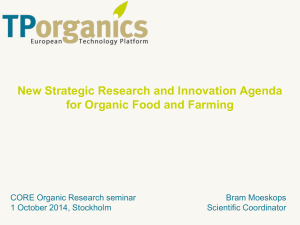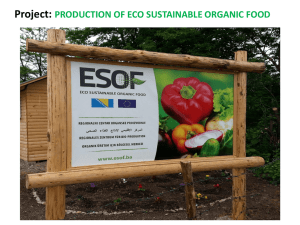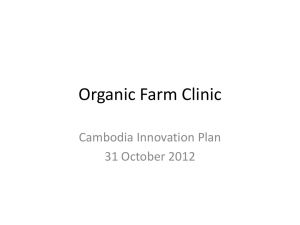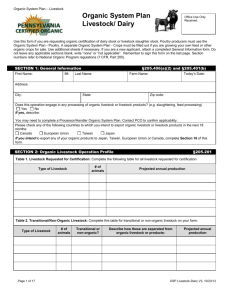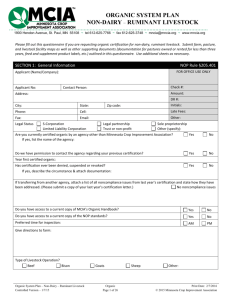EM (effective micro organisms)
advertisement
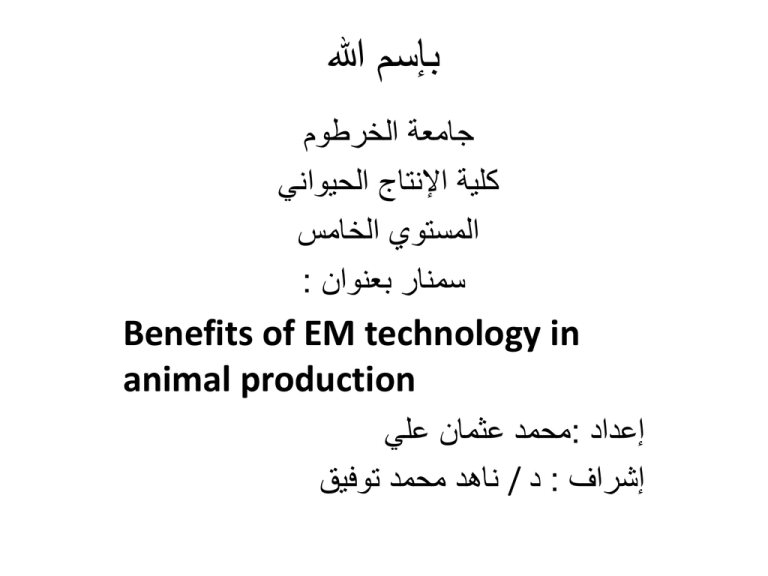
بإسم هللا جامعة الخرطوم كلية اإلنتاج الحيواني المستوي الخامس سمنار بعنوان : Benefits of EM technology in animal production إعداد :محمد عثمان علي إشراف :د /ناهد محمد توفيق EM a coined to the words effective micro organisms EM is a NATURAL PRODUCT prepared with efficient microorganisms that accelerate the natural decomposition of organic matter. The microorganisms in EM are beneficial and highly efficient. These microorganisms are not harmful, not pathogenic, not genetically modified, not chemically synthesized. They are well known natural microorganisms such as yeasts and the lactic acid bacteria (Lactobacillus) that promote the process of beneficial antioxidative fermentation, accelerate the decomposition of organic matter and promote the balance of the microbial flora. • EM is: • Non-poisonous. • Non radio-active. • Non-corrosive. • Non volatile • Non inflammable. • Does not have a quarantine period. • Biodegradable • Safe for human, animal and plant health and for the environment What Em consist from The microorganisms found in EM belong to 3 well-known groups: lactic acid bacteria (used in the making of yogurt, cheeses, etc.), yeasts (used to make breads, beers, wines, etc.) and phototrophic or photosynthetic bacteria (present in green seaweed and in any soil particle). The idea of using effective micro-organisms (EM) in agriculture was developed by Professor . Teruo Higa of the Ryukyus University in Okinawa, Japan. EM works in two main ways: a)by competitive exclusion from other harmful microorganisms b) through the production of beneficial byproducts such as enzymes, organic acids, amino acids, hormones and antioxidants Applications of EM in livestock Beneficial micro-organisms, other than contributing to the production of good wine and cheese, are also invaluable help in livestock production activities. EM has a wide range of applications in livestock production such as pasture recuperation, livestock health and installation sanitation. The use of EM Technology is simple and very much adaptable to actual conditions of livestock production systems. Use EM in Feed and Water: The use of activated EM in the feed and water given to livestock has as objective to increase the digestibility and the assimilation of nutrients as the micro-organisms such as lactobacillus and saccharomyces found in EM have been used successfully as probiotics in animal feed. In addition to making the digestive process more efficient in ruminants, EM also reduces the production of methane gas from the intestines of the animals. EM can be used in two ways in animal feed: 1. by direct fermentation of a feed source (Bokashi). 2. by direct aspersion over the concentrate or ration of the animal. What is Bokashi? The word “Bokashi” is of Japanese origin and means fermented organic matter THE Benefits 1- Eliminate the bad odor within the installations of the livestock. 2- Reduce the incidence of flies, ticks and other undesirable insect pests. 3- Significantly better the health of the animals (e.g. reduction of mastitis and diarrhea ). 4- Reduce the requirements of regular medication, antibiotics and disinfectants. 5- Reduce the stress factors of the animals thereby strengthening the immunological system against diseases. 6- Better the fertility period of the animal. 7- Animals expose to EM are noted to have better skin and healthier hoofs. 8- When used with feed it improves the digestibility of the animals and consequently better the feed conversion rate and hence an improve growth rate and weight of the animals. 9- Reduce the production of methane gas in the intestine of the animals and hence improve the feeding habit of the animals. 10- Improve microbiologically the quality of the water by its enrichment with beneficial substances such as amino acids, vitamins and enzymes that better the digestibility and nutrient assimilation of the animals. Applications of Em in poultry EM is transforming into a great tool for animal production due to its various effects as probiotics, antigens and a natural cleaner. In this same manner it can be applied in drinking water for animals and in animal feed. Use in Feed and Water One of the simplest means of using the EM is by mixing EM in the water that is given to the birds. EM can be used in two ways in birds feed: 1. by direct fermentation of a feed source (Bokashi) 2. by direct aspersion over the concentrate or ration of the animal Benefits:1- Eliminate undesirable odor from excrete. 2- Equilibrate the micro-flora within the intestines of the birds and consequently improve the feed conversion and weight gain due to increase in nutrient assimilation. 3- Reduce the incidence of diarrhea (coccidia). 4- Increase the weight gain with the same feed consumption . 5- Reduce the mortality rate. 6- Improve bird health and quality of meat through the reduction of cholesterol . 7- Produce heavier eggs ( +3.7%) with a much darker-colored yolk due to better carotene synthesis; a more consistent egg white due to improved synthesis of albumin and a harder shell due to better assimilation of calcium. 8- 6.5% increase in size of eggs. The following informs of the benefits of EM Technology. 1-Pasture Recuperation 2-Pest Control 3-Management of Organic residues 4-Installation Cleaning and Odor Control 1-Pasture Recuperation EM can be used to better the physio-chemical and microbiological conditions of soil; it also helps in accelerating natural decomposition of organic residues in the field. EM will have little effect in soils poor in organic matter (less than 1.5%) since Organic Matter is necessary for the organisms to work more efficiently. It will be required to incorporate soil organic matter within such soils. Benefits 1- Accelerate natural decomposition of residues left in the field after harvest. 2- Increase the viability and availability of nutrients in the soil 3- Maximize the conversion of organic matter into humus 4- Increase the natural production of humus and favors the production of beneficial organic substance that promotes growth and improves nutrition of the plants due to soluble phosphorus and potassium availability. 5- Increase the population of beneficial micro-organisms that helps in suppressing micro-organisms that cause diseases consequently reducing the use of pesticides. 2-Pest Control EM can be used to maintain the health of the herd. To do so it’s necessary to realize a different activation process that consists of the addition of natural products such as molasses, fruit vinegar. Benefits 12345- Reduce ticks and fly infestation on animals. Reduce stress on animals. Reduce the use of agrochemicals on the animals. Reduction in overall cost of the farm. It’s a natural product that is 100% safe to human, animal and environmental health 3-Management of Organic Residues EM can be used in the management and treatment of animal manure within the corral thereby transforming the residues in compost of excellent quality, enriched with microorganisms and beneficial substances. Benefits 1- Increase the fermentation process of organic residues between 2 to 3 weeks. 2- Increase the availability of nutrients present in the organic residues (principally, nitrogen and phosphorus). 3- Accelerate the conversion of organic matter into humus. 4- Enrich organic material with beneficial micro-organisms. 5- Reduce cost of transportation of residues destined for the field due to decrease in its volume after composting. 6- This decomposition process is odorless hence eliminating the presence of insects (e.g. house flies). 7- Eliminate bad odor and flies from the installations. 8- This method is a cheap source of manure and other organic residue management. 4-Installation Cleaning and Odor Control EM can be diluted in water storage tanks to clean the installations or simply spray manually for improve hygiene and control of odor. Benefits :1- Significantly reduce undesirable odor within the installations. 2- Reduce the presence of flies and other insects. 3- Help to obtain quality organic residues that can be used as compost. 4- Use of activated EM reduces the overall cost of operations. 5- Reduction in the use of agro-chemicals and antibiotics. CONCLUSION The EM technology when it developed was intend to contribute effectively to the agriculture and it has already applied ,but in animal production this efficiency is not effectively reached , so it’s a fertile material for more research. References • Emrojapan.com • Emroasia.com • Allaneehaya.com THANK’S



